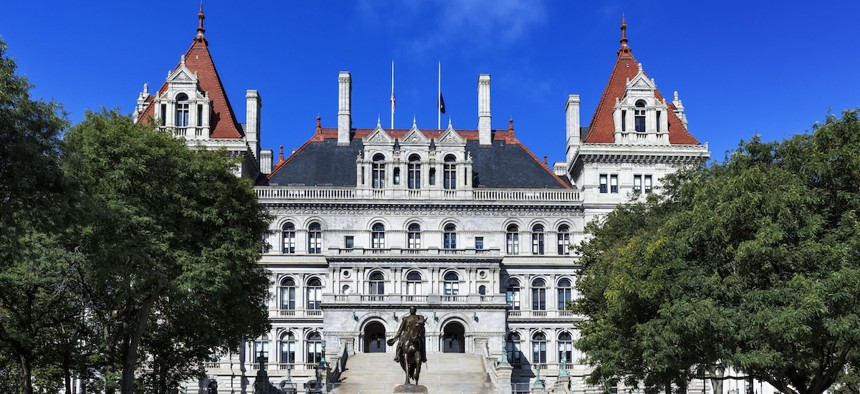Opinion
Opinion: Looming budget cuts could create a crisis for New York’s most vulnerable
An argument to restore funding for Health Homes

The New York state Capitol building in Albany (Photo by John Greim/LightRocket via Getty Images)
In January, Gov. Hochul announced a proposed $125 million funding cut to Medicaid Health Homes, a program that supports New Yorkers with chronic illnesses and complex needs. For the over 180,000 Health Home members currently enrolled across New York state, these cuts will dismantle the program that helps them access medical providers, substance use programs and social care, like housing, transportation, healthy food and more.
Twenty-five Health Homes exist today to coordinate care for New Yorkers living with serious and complex physical health, mental health and substance use disorders. This latest round of funding cuts will decimate a proven system of support for some of Medicaid’s most vulnerable recipients, while hobbling the state’s goals to promote health equity and support New Yorkers with serious medical and behavioral health concerns. Despite their success in increasing connections to care and in reducing costly in-patient admissions and emergency room visits, as well as delivering substantial cost-savings to the state, Health Homes are under siege.
As executive director of the Brooklyn Health Home and a social worker with years of experience on the front line, I know firsthand just how essential our work is to New York’s most vulnerable and underserved populations. Take one care manager’s work with a young man with serious mental health diagnoses - schizophrenia, obsessive compulsive disorder, anxiety and history of alcohol use. As his symptoms worsened, he became unable to attend school, remain employed, or maintain stable housing. A referral to the Brooklyn Health Home connected him to a dedicated care manager who helped him apply for public housing and helped him adhere to outpatient treatment and medication management. After eight months enrolled in Brooklyn Health Home, his conditions stabilized and he was able to return to college, where he is pursuing a degree in computer science.
Without this coordinated support and care management, many Health Home clients will find themselves overwhelmed and struggling to make the changes they need to be healthy. At a time when New York City is already struggling to manage serious mental illness, substance use, and chronic health conditions, these budget cuts will all but eliminate this essential support for some of our most vulnerable residents. The stakes are high, and the long-term implications for the well-being of our communities cannot be ignored.
Because Brooklyn Health Home’s care managers are often a part of the neighborhoods they serve, they are fully embedded in local communities, and deliver improved health outcomes, efficiencies in healthcare delivery and reductions in overall costs. They are on the ground and in the homes of our members, connecting individuals to resources and making sure people get the care and services they need.
Since 2012, Health Homes have been an essential partner for adults, children, and families navigating a complex and fragmented health care system, and have proven their effectiveness in reducing costly in-patient admissions and emergency room visits. Studies by the NY Health Home Coalition using state Department of Health data show that Health Home members experience a 39% reduction in hospitalizations, saving over $8 million annually. The program also saw a 52% drop in emergency room visits and a 38% reduction in readmissions in members enrolled for just 9 months, with increasing benefits from longer enrollment. These numbers are significant for a population that struggles to manage their health conditions, and show just how effective Health Homes are at easing the burden on our strained healthcare system.
Health Homes are also frontline partners in the effort to improve health equity. Statewide, nearly 80% of health home enrollees belong to historically disadvantaged groups, meaning this cut would disproportionately affect marginalized communities.
Health Homes are an indispensable resource for the community and play a pivotal role in improving community health – with success backed by the data. Yet more than the data, Health Homes are addressing the lives of our fellow New Yorkers, our neighbors and friends. The $125 million cut to Medicaid Health Home is not just a financial line item – it’s a decision that will swiftly and negatively impact community members who are already struggling to manage their health care needs. It is time to prioritize vulnerable New Yorkers and restore funding to Health Homes.
Magdalena Gordon is the executive director of Brooklyn Health Home.
NEXT STORY: Opinion: An influx of migrants does not equal more crime
